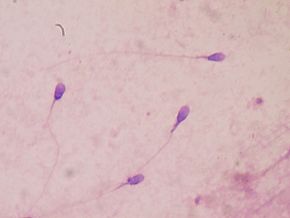 To the alarm of many, male fertility (sperm quality and sperm counts) has been rapidly declining over the past few decades. Researchers suspect that it's due to our exposure to chemicals in the environment, especially to endocrine disrupting chemicals - of which there are many, and to which we are exposed to daily. A recent study found that detrimental effects occur in the sperm of both humans and dogs when exposed to the common plastic softener DEHP and the persistent industrial chemical polychlorinated biphenyl 153 (PCB153). The researchers suggest this is because dogs live in households with humans and thus are exposed to the same environmental contaminants.
To the alarm of many, male fertility (sperm quality and sperm counts) has been rapidly declining over the past few decades. Researchers suspect that it's due to our exposure to chemicals in the environment, especially to endocrine disrupting chemicals - of which there are many, and to which we are exposed to daily. A recent study found that detrimental effects occur in the sperm of both humans and dogs when exposed to the common plastic softener DEHP and the persistent industrial chemical polychlorinated biphenyl 153 (PCB153). The researchers suggest this is because dogs live in households with humans and thus are exposed to the same environmental contaminants.
DEHP (diethylhexyl phthalate) is an endocrine disruptor (interferes with hormone systems) that is found in plastic materials in many household and personal items - for example, in carpets, vinyl flooring, some upholstery, rainwear, wires, some plastic toys, fragrances and air fresheners, some PVC pipes, some food packaging, medical tubing, plastic shower curtains. The problem is that it slowly leaches out of the products and into the air and household dust, it leaches out of packaging into foods (which we then ingest), and it can also be absorbed through direct skin contact. Bottom line: try to avoid DEHP by avoiding plastics known as polyvinyl chloride (PVC) or vinyl as much as possible. (One can't totally avoid them, but can reduce exposure to them.)
From Science Daily: Chemical pollutants in the home degrade fertility in both men and dogs, study finds
New research by scientists at the University of Nottingham suggests that environmental contaminants found in the home and diet have the same adverse effects on male fertility in both humans and in domestic dogs.
There has been increasing concern over declining human male fertility in recent decades with studies showing a 50% global reduction in sperm quality in the past 80 years. A previous study by the Nottingham experts showed that sperm quality in domestic dogs has also sharply declined, raising the question of whether modern day chemicals in the home environment could be at least partly to blame.
In a new paper published in Scientific Reports, the Nottingham team set out to test the effects of two specific human-made chemicals namely the common plasticizer DEHP, widely abundant in the home (e.g. carpets, flooring, upholstery, clothes, wires, toys) and the persistent industrial chemical polychlorinated biphenyl 153, which although banned globally, remains widely detectable in the environment including food.
The researchers carried out identical experiments in both species using samples of sperm from donor men and stud dogs living in the same region of the UK. The results show that the chemicals, at concentrations relevant to environmental exposure, have the same damaging effect on sperm from both man and dog.
Leading the work, Associate Professor and Reader in Reproductive Biology at the School of Veterinary Medicine and Science, Richard Lea, said: "This new study supports our theory that the domestic dog is indeed a 'sentinel' or mirror for human male reproductive decline and our findings suggest that human-made chemicals that have been widely used in the home and working environment may be responsible for the fall in sperm quality reported in both man and dog that share the same environment."
"Our previous study in dogs showed that the chemical pollutants found in the sperm of adult dogs, and in some pet foods, had a detrimental effect on sperm function at the concentrations previously found in the male reproductive tract. This new study is the first to test the effect of two known environmental contaminants, DEHP and PCB153, on both dog and human sperm in vitro, in the same concentrations as found in vivo.
Rebecca Sumner, who carried out the experimental work as part of her PhD, said "In both cases and in both subjects, the effect was reduced sperm motility and increased fragmentation of DNA. Dr Sumner added: "We know that when human sperm motility is poor, DNA fragmentation is increased and that human male infertility is linked to increased levels of DNA damage in sperm. We now believe this is the same in pet dogs because they live in the same domestic environment and are exposed to the same household contaminants. This means that dogs may be an effective model for future research into the effects of pollutants on declining fertility, particularly because external influences such as diet are more easily controlled than in humans."
 Human sperm stained for semen quality testing in the clinical laboratory. Credit: Wikipedia
Human sperm stained for semen quality testing in the clinical laboratory. Credit: Wikipedia
